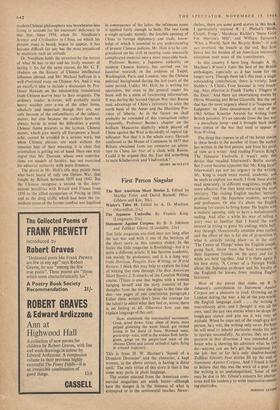First Person Singular
Winter's Tales 10. Edited by A. D. Maclean. (Macmillan, 21s.)
THE little magazine era died here not long after the last war and with it one of the heydays of the short story in this country ended. In the States the little magazine is flourishing—but it is quite a different article. It has become academic, run mainly by professors, and it is a long way from Horizon, Penguin New Writing, or World Review. 1 think this may help to explain the kind of writing that runs through The Best American Short Stories 2. It smacks of the Creative Writing course. (There is one that begins with a woman hanging herself and the story consists of her thoughts from the time she drops to the time she dies—ten pages of one continuous paragraph.) Either these writers don't have the courage (or the talent) to admit what they feel or, worse, there is no feeling at all. Otherwise how can one explain language of this sort :
Slow, mammoth the intermeshed movement. Crust, grind down. Gray slime of brain, meat pulped glistening the warm blood, gut twined loving in the shard of bone. Wormed mass, grave-drip----take, stuff in the sodden flesh bottle- green, gorge on the purple-toed meat of the obscene Christ and jazzed cathedral lights flying in crossed trajectory. . . .
This is from H. W. Blattner's 'Sound of a Drunken Drummer' and the character, a kept woman, in the above extract, is having 'a dizzy spell.' The only virtue of this story is that it has some sexy parts in plain language.
The stories selected from the American com- mercial magazines are much better—although here the danger is in the thinness of what is attempted or in the sentimental touches. Never- theless, there are some good stories in this book. I particularly enjoyed R. C. Phelan's "'Birds, Clouds, Frogs'; Mordecai Richler's 'Some Grist For Mervyn's Mill'; and William Saroyan's 'What a World, Said the Bicycle. Rider'—if you can overlook the treacle at the end. But how hea% y lies the burden of an American university education over most of the contributors.
In this country I have long thought A. D. Maclean's Winter's Tales the best of the British anthologies, especially as it has room for the longer story. Though there isn't, this year, a single outstanding contribution, there is variety. Jean Stubbs's 'A Child's Four Seasons' is very touch- ing. Also effective is Frank Tuohy's 'Fingers in
the Door.' And there are entertaining stories bY Olivia Manning and Brian Glanville. But the one
that has the most urgency about it is 'Suspense of
Judgment by Zeno (pseudonym of one of the 1963 Arthur Koestler Awards for writing from British prisons). It's an episode from the last war —a parachute jump—and it brought back those true stories of the war that used to appear in New Writing.
The thing that repeats in all of the better stories in these books is the number of times the author has written in the first person, and from his point of view as a writer. And reading Francis King's The Japanese Umbrella it wasn't only this device that recalled Isherwood's Berlin stories. But it soon became apparent that Mr. King hasn't Isherwood's eye nor his urgency in the writing, Mr. King is much more muted, academic, and he tends to explain too much. I think these stories read separately, in different magazines, might be more effective. For they keep retracing the sante territory. The visiting English teacher, lecturer, professor, and the Japanese students, servants, and professors. Or else it's about the English hunting for curios to bring home. He begins with a realistic opening, only to have a melodramatic ending. And after a while his way of telling .a story was so familiar that I found the main interest in trying to guess his endings while half. way through. Occasionally emotion does surface and the effect of this is far out of proportion to what is actually taking place--as in the story The Centre of Things' when the English couple, going back, throw from the boat streamers to their Japanese friends on the quay and for .3 while are held together. And it is there again his best story, 'A Corner of a Foreign Field. about the Japanese professor and his loyalty to the England he knows from reading English literature.
Most of the pieces that make up B. S. Johnson's contribution to Statement Again- Corpses are a pleasure to read. Growing up lo London during the war; a bit of the pop-world: the English language itself . . . the writing !s marvellously alive, and I thought it was all his own, until the last two stories where he drops the tough-guy stance and you see it was only ao attitude. When he steps out of the tough-guy first person, he's soft, the writing only so-so. PerhaPs he will need to inhabit particular masks for hull to operate successfully. As stories, they are only gestures in that direction. I was reminded of 3 boxer who is showing his admirers what he call do—anyone can see he's got the equipment for the job—but so far he's only shadow-boxing. Zulfikar Ghose's four stories fill up the end of Statement Against Corpses. And I found it hard to believe that this was the work of a poet. Fo.r the writing is so undistinguished. Some of this may be due to Mr. Ghose's concern for abstrae' tions and his tendency to write impressive-sound- ing platitudes.
NORMAN LEVINE










































 Previous page
Previous page